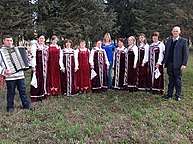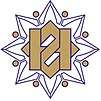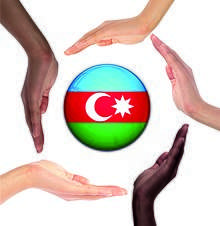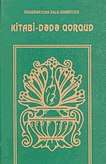Multiculturalism in Azerbaijan
Multiculturalism is directed to protect differentiation of cultures of people from different nationalities and religions from whole world, integrate national culture of minor nations and countries.
Only in Baku there are more than 20 associations of Russians, Ukrainians, Kurds, Lacquers, Lezgins, Slavs, Tatars, Georgians, Ingiloy people, Talysh people, Avars, Meskhetian Turks, Europeans and Mountain Jews, Georgian Jews, Germans and Greeks. Generally, there are such associations that live in a compact form in all regions.
Minor nations

There are more than ten places where minor nations such as mountain Jews- Red Town (Qırmızı Qəsəbə which is well known Krasnaya Sloboda), Molokan Village Ivanovka, Village of Udin people - Nij, Khinalugs with their famous language, specific customs and traditions are living in Azerbaijan. There are some ethnic minorities, also Russian, Lezgian, tat, Talysh and other minor nations that are represented by their members in the National Assembly. Interethnic, multiculturalism and state department on religious issues of Azerbaijan was created in February 2014.

Qırmızı Qəsəbə (Krasnaya Sloboda)
Qırmızı Qəsəbə people speak in 3 languages: Judeo-Tat which mountain Jews speak in daily life, the Russian and Azerbaijani language. All lessons are conducted in one of two schools in Russian language and in another one in Azerbaijani language. But at the same time, Hebrew language which is the native language of Jews is taught at both schools. Also, school books in their own language are prepared for them in Azerbaijan. Today, around 4-5 thousand Jews live in Krasnaya Sloboda.[1][2]
The national political conception
The national political conception of Republic is based on international documents;
- The Universal Declaration of Human Rights (UDHR)
- European Convention on Human Rights
- International Covenant on Economic, Social and Cultural Rights (ICESCR)
- Organization for Security and Co-operation in Europe (OSCE)
- Document of the Copenhagen Meeting of the Conference on the Human Dimension of the CSCE[3]
- Declaration on the Rights of Persons Belonging to National or Ethnic, Religious and Linguistic Minorities[4]
The State Committee for Work with Religious Organizations of Azerbaijan Republic provides 21 non-Muslim religious groups’ activities about “Freedom of Religion” Law of Azerbaijan and carries out the execution of this law. There are provisions about equality of rights and liberties of everyone, irrespective of race, nationality, religion, language, sex, origin, financial position, occupation, political convictions, membership in political parties, trade unions and other public organizations at the Constitution of Azerbaijan.[5] (Article 25, 44)
The culture ministers of the Organization of Islamic Cooperation were invited to the meeting of the European Union member countries which was carried out in Baku for the first time in 2008.
The culture ministers of European Union took part in the meeting of the member countries of the Organization of Islamic Cooperation which was conducted in Baku, 2009. Later, the attempt called as “Baku process” stimulated the summit meeting of the world leaders, intercultural dialogue and Baku International Humanitarian Forums in Azerbaijan.[6]
In 2011, Intercultural Dialogue Forum was the next event held in Azerbaijan.[7]
On 15 May 2014, Azerbaijani president signed the decree on the establishment of Baku International Multiculturalism centre. [8]
The World Intercultural Dialogue Forum II and Worldwide Intercultural Dialogue Forum III held from 29 May to 1 June in 2013 and “Living in peace in a multicultural world” from 18-19 May in 2015 and 4th World Forum on Intercultural Dialogue [9] have an important role social and cultural environment in Azerbaijan. The main representatives were UNESCO, UN Alliance of Civilizations, World Tourism Organization, Council of Europe, North-South Center of the Council of Europe, ISESCO.[10]
Activity of Haydar Aliyev Foundation

Opening Educational Complex for Jewish children in Baku, restoration of Church in France and Holy Roman catacombs by Haydar Aliyev Foundation[11][12][13][14][15][16], erection of a Monument to Prince Vladimir in Astrakhan[17][18], Creation of Ohr Avner Chabad Day School for Jewish children and exhibited photos for demonstrating of Azerbaijani Religious Tolerance by world-famed photojournalist Reza Deghati serve mutual respect and healthy friendly relationship between different countries.[19]
Year of Multiculturalism

According to the current activities, related to the saving of multiculturalism principles, improving and wide usage of it, Ilham Aliyev announced that year 2016 is called ‘’year of multiculturalism’’ with the provided order, thereafter Aliyev acknowledged ‘’Activities plan’’ related to the announcing 2016 as a year of multiculturalism. In order to execute ‘’activities plan’’, Baku International Multiculturalism Center was developed to improve execution and relations between nations, conferences, and cultures in different projects.[20]
The module of ‘’Multiculturalism of Azerbaijan’’ has been studied at the different universities worldwide including Russia, Italy, Bulgary, Belarus, Lithuania, Czech Republic, Georgia and in 7 high schools of Azerbaijan since spring semester of 2015. During the next semester, this module was studied in Switzerland, Portugal, Ukraine. and Turkey.
The role of libraries in promoting of multiculturalism

The history of multiculturalism in Azerbaijan nation is not only described in the current tolerant lifestyle of people, but also in the created documents related to the literary, scientific-philosophical and political-legal sources. Multiculturalism and propagation of universal values can be encountered in the literature from epos ‘’Kitabi-dede Gorgud’’[21] to the newest ones and in Medieval Azerbaijani poetry respectively. The creator of artistic creativity examples and well known Nizami Ganjavi can be especially highlighted. He wrote ‘’Yeddi Gozel’’ (The Seven Beauties[22]) that included seven different cultures in the 12th century. The humanity was the criterion of personality for the Nizami Ganjavi. The heroes of this poet are representing the nations of Turkish, Persian, Arabic, Indian, Chinese, Greek and Georgian as long as he was against racial, national and religious discriminations.
See also
References
- "Red Village – Settlement of Mountain Jews".
- "JEWS IN AZERBAIJAN: A HISTORY SPANNING THREE MILLENNIA".
- "Document of the Copenhagen Meeting of the Conference on the Human Dimension of the CSCE".
- "Belonging to National or Ethnic, Declaration on the Rights of Persons Religious and Linguistic Minorities" (PDF).
- "The Constitution of the Republic of Azerbaijan" (PDF). Archived from the original (PDF) on 2011-10-26. Retrieved 2017-09-25.
- "Ministerial roundtable on "Fostering Dialogue and Cultural Diversity – Baku Process: New Challenge for Dialogue between Civilizations".
- "World Forum on Intercultural Dialogue".
- "Azerbaijani multiculturalism".
- "Ilham Aliyev attends opening of 4th World Forum on Intercultural Dialogue". Archived from the original on 2017-09-26. Retrieved 2017-09-25.
- "UNAOC co-organizes the 4th World Forum on Intercultural Dialogue on the theme "Advancing Intercultural Dialogue: New Avenues for Human Security, Peace and Sustainable Development"".
- "Contributions by the Heydar Aliyev Foundation to Christian culture in the Italian and Vatican mass media".
- "Saint Marcellino and Pietro's catacombs".
- "Restaurate le catacombe di Marcellino e Pietro".
- "Una matrona in paradiso l'ultimo segreto di Costantino".
- "Heydar Aliyev Foundation funds restoration of catacombs".
- "Heydar Aliyev Foundation funds restoration of catacombs of Sts. Marcellinus and Peter".
- "A monument to Prince Vladimir in Astrakhan".
- "In Astrakhan school opened".
- "The photo-exhibition "Azerbaijan- the country of tolerance" by world-renowned photographer Reza Deghati is successfully completed".
- "2016 declared Year of Multiculturalism in Azerbaijan". Archived from the original on 2017-09-26. Retrieved 2017-09-25.
- "Kitabi-dede Gorgud".
- "HAFT PEYKAR".